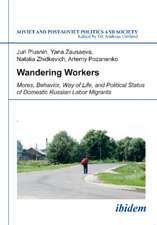Immigration Policy in the Federal Republic of Germany
Autor Douglas B. Klusmeyer, Demetrios G. Papademetriouen Limba Engleză Paperback – 30 apr 2013
| Toate formatele și edițiile | Preț | Express |
|---|---|---|
| Paperback (1) | 264.82 lei 6-8 săpt. | |
| BERGHAHN BOOKS INC – 30 apr 2013 | 264.82 lei 6-8 săpt. | |
| Hardback (1) | 807.44 lei 6-8 săpt. | |
| BERGHAHN BOOKS INC – 31 oct 2009 | 807.44 lei 6-8 săpt. |
Preț: 264.82 lei
Nou
Puncte Express: 397
Preț estimativ în valută:
50.67€ • 52.91$ • 41.94£
50.67€ • 52.91$ • 41.94£
Carte tipărită la comandă
Livrare economică 04-18 aprilie
Preluare comenzi: 021 569.72.76
Specificații
ISBN-13: 9780857456250
ISBN-10: 0857456253
Pagini: 336
Dimensiuni: 152 x 229 x 18 mm
Greutate: 0.47 kg
Editura: BERGHAHN BOOKS INC
ISBN-10: 0857456253
Pagini: 336
Dimensiuni: 152 x 229 x 18 mm
Greutate: 0.47 kg
Editura: BERGHAHN BOOKS INC
Notă biografică
Douglas B. Klusmeyer teaches in the Department of Justice, Law and Society in the School of Public Affairs at American University, Washington, DC. He has both a PhD in modern European history and a JD in law from Stanford University. Previously, he was the codirector of the Carnegie Endowment's Comparative Citizenship Project and an associate with the Endowment's International Migration Policy Program. His publications focus on migration, citizenship, political ethics, and international politics. Demetrios G. Papademetriou is the President of the Migration Policy Institute and holds a PhD in Comparative Public Policy and International Relations. He has taught at the University of Maryland, Duke University, and the New School and was formerly the chair of the Migration Committee of the Paris-based OECD; director for Immigration Policy and Research at the US Department of Labor, and chair of the Secretary of Labor's Immigration Policy Task Force; and executive editor of the International Migration Review. He has published more than two-hundred books, articles, monographs and research reports on migration topics and advises senior government and political party officials in more than twenty countries.
Cuprins
List of Tables and Figures Acknowledgments Introduction PART I: MEMBERSHIP AND THE BASIC LAW Chapter 1. The International Dimension Chapter 2. The Federalist Dimension Chapter 3. The Civic/Political Dimension Chapter 4. The Social Dimension Chapter 5. The Ethnonational Dimension Chapter 6. Debating Concepts of National Membership Chapter 7. Integration, National Identity, and the Quest for Homogeneity PART II: LAYING THE FOUNDATION FOR MANAGING MIGRATION, 1949 - 1990 Chapter 8. The Descent of the Aussiedler and the Politics of the German Diaspora Chapter 9. The Federal Republic as German Homeland Chapter 10. A Tradition of Imported Labor Chapter 11. Between Retreat and Reform: Naturalization Laws and the Challenge of Integration Chapter 12. Aliens Policy and the Federal Courts Chapter 13. The FRG's International Refugee Challenge Chapter 14. Reunification: Triumph and Tragedy PART III: GERMANY INSIDE THE EUROPEAN UNION Chapter 15. Reforming the Frameworks: The Maastricht Treaty and The Basic Law Chapter 16. The Regulation of Asylum Chapter 17. Rethinking Legacies: The New Aussiedler Policy Chapter 18. Jewish Immigration: Contesting and Confirming Germany's Policies toward Immigrants Chapter 19. Reforming German Citizenship Law Chapter 20. Bilateral Agreements Chapter 21. Temporary Labor Migration Programs Chapter 22. The Amsterdam Treaty and the Emergent EU Migration Policy PART IV: GERMANY FACES THE FUTURE: NEW INITIATIVES, OLD HABITS Chapter 23. Green Cards and Leitkultur Chapter 24. Germany's and Europe's Demographic Dilemmas Chapter 25. Embracing Immigration: Laying the Foundation for a New Policy Chapter 26. From Policy Vision to Legislative Reality: The Making of the 2005 Migration Law Chapter 27. Integration and the Migration law Conclusion: Negotiating Difference and Belonging in Today's Germany Selected Bibliography Index
Recenzii
"To produce a book as thorough and useful as this one represents a major achievement. Anyone wanting an introduction to immigration in the Federal Republic should start with Klusmeyer and Papademetriou." * European History Quarterly "By providing an up-to-date account, this book fills a need and should be of interest to scholars, policy researchers, and students - I recommend this book as a very helpful overview of a policy area that has changed rapidly." * German Studies Review "The authors are two of the most innovative and refreshing thinkers on migration and integration policy worldwide. What makes this book extraordinary is its nuanced evaluation of historical and contemporary migration policies, including all the ambivalence and contradictions that have accompanied these policy debates in Germany. The book also distills the positive paradigm of change that has recently emerged; it identifi es new opportunities and unsolved challenges in German migration and integration policies. With this book, the authors have made a timely and very important contribution to understanding the root causes and key challenges to immigration reform in the Federal Republic of Germany." * Rita Sussmuth, Chair of the EU High Level Group on "Social Integration of Ethnic Minorities and their full Participation in the Labor Market," former Chair of Germany's Independent Immigration Commission, and former President of the German Federal Parliament. "...[T]he most authoritative and comprehensive study ever written on German immigration, citizenship and asylum policies. It offers a fresh view on well and less well known facts interpreted and put into perspective by two well known scholars of international migration policy." * Rainer Munz, Senior Fellow at the Hamburg Institute of International Economics "This masterful, comprehensive, and incisive book lets us know how the largest and richest country in Europe has struggled to balance its commitment to its national character with the inevitability of migration-driven change. It is the definitive analysis of this vexing policy arena in Germany." * John Mollenkopf, Director, Center for Urban Research & Distinguished Professor, Political Science and Sociology, CUNY "This is a very timely and important book, and will provide immigration scholars on both sides of the Atlantic a clear understanding of developments related to immigration and integration policy in Germany. The authors' pragmatic and critical approach addresses the years that Germany spent in denial of its status as a country of immigration and the impact this had on policy development. Germany is a key player in the European Union, and developments there will deeply impact developments related to immigration policy at the EU level." * Terri E. Givens, Associate Professor, University of Texas at Austin












